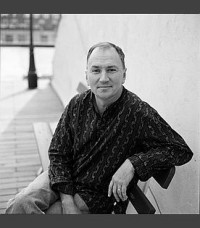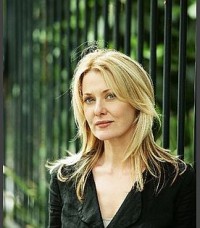Blog Archives
Switching to Fiction: Christopher Kremmer, Anna Funder, Leslie Cannold and Malcolm Knox
 When Christopher Kremmer fled from an op shop where he’d found a bound collection of old Sydney Morning Herald newspapers from the period when his father had been a jockey in the Melbourne Cup, he realised that his ‘whole life was about running away from the past’. This time, he decided to turn back around and face it, and was drawn into the stories of the horseracing world. His novel The Chase tells the story of a scientist, Jean Campbell, trying to root out drug use in the horse racing industry. Even for the experienced non-fiction writer and journalist, research was nigh impossible: ‘the world of horseracing is a world of secrets … it’s all about masking what goes on to increase the odds’. To make his task even more complicated, the real-life scientist Kremmer was basing Campbell on had never left any records.
When Christopher Kremmer fled from an op shop where he’d found a bound collection of old Sydney Morning Herald newspapers from the period when his father had been a jockey in the Melbourne Cup, he realised that his ‘whole life was about running away from the past’. This time, he decided to turn back around and face it, and was drawn into the stories of the horseracing world. His novel The Chase tells the story of a scientist, Jean Campbell, trying to root out drug use in the horse racing industry. Even for the experienced non-fiction writer and journalist, research was nigh impossible: ‘the world of horseracing is a world of secrets … it’s all about masking what goes on to increase the odds’. To make his task even more complicated, the real-life scientist Kremmer was basing Campbell on had never left any records.
Then there’s the balancing act between a non-fiction writer’s research instinct and the novelist’s creative impulse: ‘You overresearch it, but you get to a point where you need to let go of those real people. Once you start doing that you start to be able to pour yourself into these character.’
Chair Geordie Williamson asked whether there was any pressure on Anna Funder to follow up her acclaimed account of the former East Germany, Stasiland, with something in a similar vein? ‘My husband said I had second-album syndrome, which I don’t think is true,’ said Funder of her new novel, All That I Am.
In non-fiction, Funder believes, it’s important to honour the people you’re writing about, so in Stasiland, for which she spoke with people whose courage had been ‘almost unbelievable’, she wanted to pay tribute to that. With All That I Am, though, the people on which Funder based her characters are no longer alive, and what happened isn’t known, so ‘I looked at shards of history and put together a plot which I think is the most likely thing that happened’. While this lack of material might seem less advantageous, there is an upside: ‘The biggest moral limit of non-fiction is not being able to represent the consciousness of your characters from the inside. That was a huge liberation.’
with people whose courage had been ‘almost unbelievable’, she wanted to pay tribute to that. With All That I Am, though, the people on which Funder based her characters are no longer alive, and what happened isn’t known, so ‘I looked at shards of history and put together a plot which I think is the most likely thing that happened’. While this lack of material might seem less advantageous, there is an upside: ‘The biggest moral limit of non-fiction is not being able to represent the consciousness of your characters from the inside. That was a huge liberation.’
Leslie Cannold ‘didn’t make a conscious choice to write a novel’. The impetus for writing The Book of Rachael was a BBC documentary attempting to unearth historical truths about the life of Jesus. Cannold ‘started wondering what my family were up to’ at this time – but it became clear that the historical record was not concerned with women. Fronting up to the library, Cannold demanded everything that existed on Jesus’s sisters, but she was told there was basically no existing material on the subject. Cannold decided it would be her responsibility to tell such a story.
Where fiction and non-fiction do mix, suggested Malcolm Knox, was ghostwriting. Someone like the famously laconic Bart Cummings is hard to write a 300-page book about, so the tools of fiction can assist in creating a narrative. Yet there is a point at which you have to stop and go no further – you can’t make anything up. In regard to Knox’s novel The Life, there was at least one good reason not to write a biography of surfer Michael Peterson – one had already been written. But he ‘was always about 50 per cent fiction anyway’, said Knox.
All the guests thought of fiction as serving a different purpose to non-fiction in telling a story. Cannold thought that if she wanted to write about something about which there was very little known, she would elect to use fiction. Kremmer thought that, for his next book, he would probably be returning to the more familiar ground of non-fiction, but not because fiction was unsatisfying: ‘I found it one of the great experiences of my writing career’.